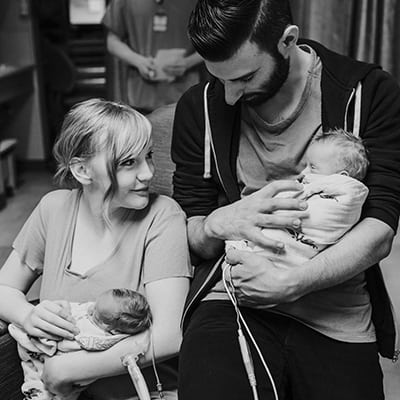“Without RMHC we would not be able to stay here while our girls recover. This would have been heartbreaking considering the fragile state they were in!”
Baby Valerie was found to have a rare congenital heart defect and was diagnosed with Selective Growth Restriction while in the womb with her twin sister, Eleanor. This diagnosis meant Matthew and Kathryn Dockter knew their pregnancy would be complicated, high-risk, and stressful. It also meant making the long 6-hour round trip drive from Mandan to Fargo for weekly doctor appointments.
During one of these routine weekly appointments in Fargo, doctors discovered that the membrane separating the two Dockter twins had ruptured and the girls shared the same sac. This presented an immediate danger to both twins so Kathryn was admitted into the hospital right away. After finding out their precious girls were sharing the same sac, Matthew and Kathryn were overcome with even greater concern and uncertainty.
Three weeks after Kathryn was admitted into the hospital, Valerie and Eleanor were born 10 weeks premature. Due to their fragile condition, they were incubated in the NICU for several months. Baby Eleanor was able to go home after completing the fairly standard prematurity process while Valerie, because of her heart defect, underwent a hospital transfer and successful open-heart surgery.
Another additional stressor the Dockters faced during this experience was a significant income cut. Due to Kathryn not being able to work through her high-risk pregnancy, the family could not pay for their own lodging while the girls were receiving care in the NICU. The Ronald McDonald House offered an affordable place to stay which allowed the Dockters to focus on what mattered most: helping their baby girls recover. “Doctors told us that doing things such as skin-to-skin holding is a crucial part of their recovery and beneficial to their health. Because we could stay at the RMH, we were able to provide this, among other care, to our girls.”
In the midst of such a prolonged stressful time, the Dockters were able to find comfort and security in their temporary home at the Ronald McDonald House despite being displaced from their real home. They spoke of how having freedom and their own space “really does help lessen the burden and make the best of a difficult situation.”
The Dockters also found encouragement in the staff, volunteers, and other families at RMHC. They said, “The sense of community that forms as everyone is walking through the same hard situations allows everyone to draw strength from each other. There’s a sense that we’re in this together and we support each other and celebrate their wins!”
Baby Valerie was found to have a rare congenital heart defect and was diagnosed with Selective Growth Restriction while in the womb with her twin sister, Eleanor. This diagnosis meant Matthew and Kathryn Dockter knew their pregnancy would be complicated, high-risk, and stressful. It also meant making the long 6-hour round trip drive from Mandan to Fargo for weekly doctor appointments.
During one of these routine weekly appointments in Fargo, doctors discovered that the membrane separating the two Dockter twins had ruptured and the girls shared the same sac. This presented an immediate danger to both twins so Kathryn was admitted into the hospital right away. After finding out their precious girls were sharing the same sac, Matthew and Kathryn were overcome with even greater concern and uncertainty.
Three weeks after Kathryn was admitted into the hospital, Valerie and Eleanor were born 10 weeks premature. Due to their fragile condition, they were incubated in the NICU for several months. Baby Eleanor was able to go home after completing the fairly standard prematurity process while Valerie, because of her heart defect, underwent a hospital transfer and successful open-heart surgery.
Another additional stressor the Dockters faced during this experience was a significant income cut. Due to Kathryn not being able to work through her high-risk pregnancy, the family could not pay for their own lodging while the girls were receiving care in the NICU. The Ronald McDonald House offered an affordable place to stay which allowed the Dockters to focus on what mattered most: helping their baby girls recover. “Doctors told us that doing things such as skin-to-skin holding is a crucial part of their recovery and beneficial to their health. Because we could stay at the RMH, we were able to provide this, among other care, to our girls.”
In the midst of such a prolonged stressful time, the Dockters were able to find comfort and security in their temporary home at the Ronald McDonald House despite being displaced from their real home. They spoke of how having freedom and their own space “really does help lessen the burden and make the best of a difficult situation.”
The Dockters also found encouragement in the staff, volunteers, and other families at RMHC. They said, “The sense of community that forms as everyone is walking through the same hard situations allows everyone to draw strength from each other. There’s a sense that we’re in this together and we support each other and celebrate their wins!”



